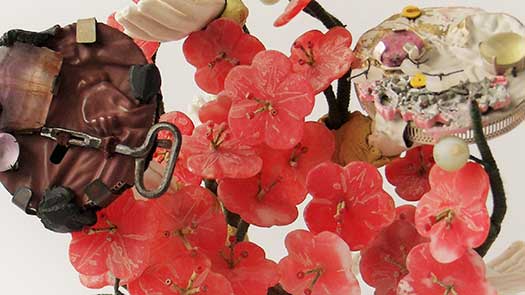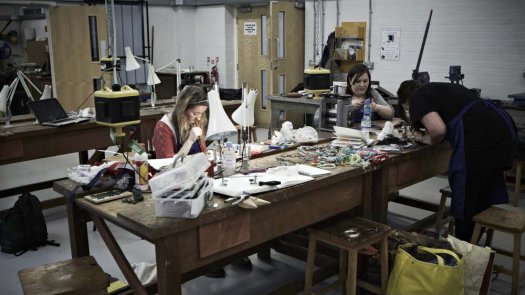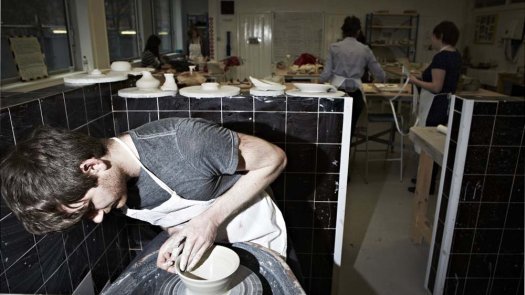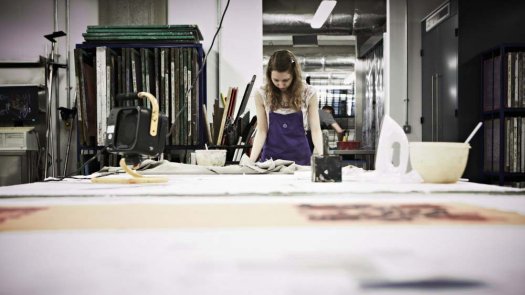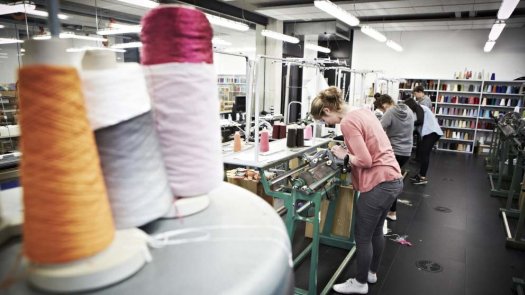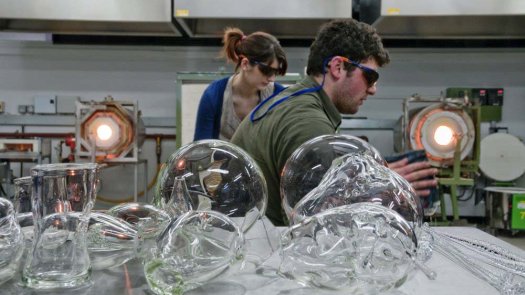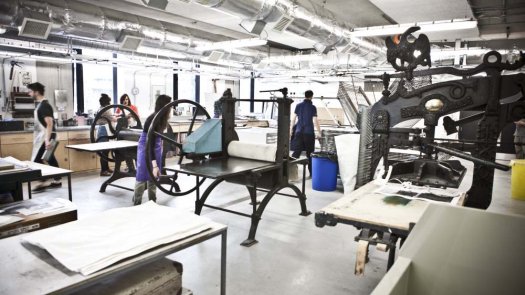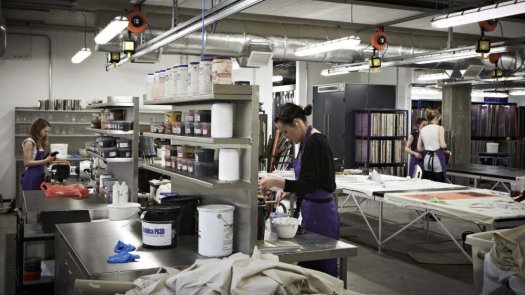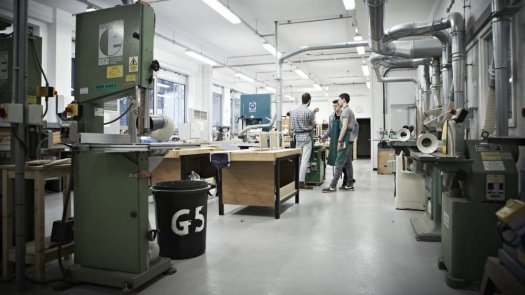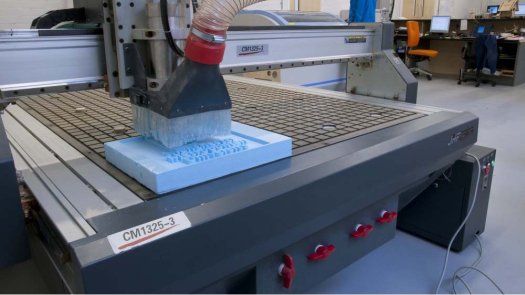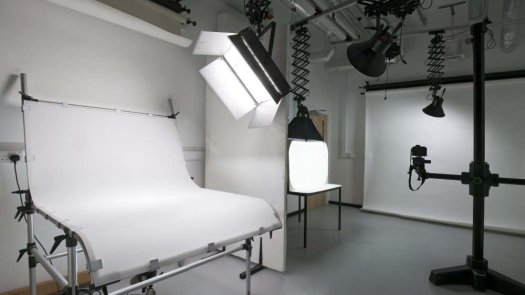Craft
Craft
MSc – 1 year (full-time) or 2 years (part-time)
This course is at the forefront of craft making practices, and is for materially engaged makers who are looking to explore craft practices across a range of materials and object types. It encourages the development of craft across specialist and multi-material making, investigating and exploring definitions of contemporary craft practice.
The programme is an opportunity to pursue a making practice that might already be located within a specific material area or object definition such as glass, ceramics, textiles or jewellery, or to develop and expand the definitions and materials of craft practice. The programme supports the exploration of genre-breaking approaches to making, to develop individual and personal methodologies and philosophies, and locate these within a deep understanding of historical, contemporary and future craft making practices, and wider social and cultural contexts.
With access to the wide range of hand, machine and digital technologies at Manchester School of Art, you will work within, across and between definitions of craft, to evolve and progress a unique and personal making practice. In addition to traditional material workshops across ceramics, hot and cold glass, metal, wood, textile print, weave and embroidery, there are digital making facilities for laser cutting, 3D printing, CNC routing, and digital print for textiles and ceramics, with access to specialist academic and technical expertise from across the School of Art, to support the development of a wide range of craft making practices.
Features
- —While studying towards a particular qualification at MA/MSc level, students experience their subject in the broader context of contemporary design practice.
- —Dedicated spaces have been developed to enable the postgraduate community to flourish. These spaces, for thinking and practice, are at the heart of Manchester School of Art, allowing easy access to an extensive range of workshops where the combination of traditional and state of the art equipment opens up a world of exciting possibilities.
- —You will be taught by research active staff who are part of the Manchester School of Art Research Centre and experts in their field.
- —The University library has outstanding Art and Design holdings, including a special collection of artists' books and ephemera.
Course Content
You will undertake core units delivered by craft making specialists, consisting of design theory and practice lectures, workshops in hand, machine and digital making, group seminars, individual tutorials, live external projects, and research study trips.
Option units facilitate innovative cross-disciplinary opportunities, supporting the development of collaborative working with students from across the wider postgraduate design community.
Each student’s programme of study is managed through personal learning plans, developed in response to their individual creative and professional ambitions. The final “Synthesis” unit determines the postgraduate award, with the MSc reflecting work that has a more technically innovative focus, and the MA for work that addresses more materially creative or culturally focussed agendas. This innovative structure provides students with the opportunity to convert their practice from BA to MSc, and vice versa.
Year 1 (MA Full-Time)
The MA/MSc in Craft is composed of five units, totalling 180 credits.
Researching, Mapping and Locating
30 credits
30 credits
30 credits
Art & Design: Culture & Context (MA:X)
30 credits
Design Thinking
This module introduces an applied understanding of how design can be used as an iterative process for creative problem solving. It will enable you to understand how to apply design thinking processes to your specialist area through understanding users, challenging assumptions, redefining problems and creating innovative solutions to prototype and test. The module will also provide a broad introduction to research methodologies, strategic research planning and research design. A range of design thinking tools will be introduced and explored before you undertake an in-depth project that provides opportunities for experimentation leading to innovative solutions.
Researching, Mapping and Locating
This module will enable you to gain an understanding of design practices, perspectives and contexts. You will establish a substantive individual position for personal practice within the expanded field of design. During the module you will work towards the production of a project proposal which will determine the ongoing research, mapping and locating of your position within contemporary design practice.
Colour, Material & Finish
This module will enable you to explore the language of material making, process and enquiry. Briefs will stimulate you to generate a range of practice-based responses to questions of context, concept, making, manufacturing, materiality, visual language and sustainability.
Synthesis Project: Craft (MA)
The final Synthesis MA module will support you to develop, resolve and present a significant body of work, located within a defined area of craft practice. The module accommodates opportunities for external, collaborative or international learning experiences, and enables you to undertake and submit work developed within professional placements and/or live projects.
The module synthesises the specialist craft practice which you will have developed throughout the programme. It also accommodates the opportunity to present your work in progress and to engage in interdisciplinary critiques to test ideas, gain feedback and support the development of your final body of work.
The content of your practice is negotiated with specialist craft staff and you will manage your learning via the development of a Synthesis project proposal. The module features a flexible assessment submission process which combines written and practical elements, the weighting of which being responsive and appropriate to your individual future ambitions, be they professionally or academically focussed.
Synthesis Project: Craft (MSc)
This final MSc module will support you to develop and resolve a significant body of specialist craft practice. Your learning journey will be synthesised by the presentation of an innovatively ambitious project, located within a defined area of technical, market orientated or advanced digital craft practice.
The module accommodates opportunities for external collaborative, industry based or international learning experiences and enables you to undertake and submit work developed within professional placements and/or live projects. The module features a presentation of your work in progress to test ideas, gain feedback and to engage in interdisciplinary critique to support the development of your final body of work.
The content of your practice is negotiated with specialist craft staff and you will manage your learning via the development of a Synthesis project proposal. The module features a flexible assessment submission process which combines written and practical elements, the weighting of which being responsive and appropriate to your individual future ambitions, be they professionally or academically focussed.
Art & Design: Culture & Context (MA:X)
This module offers focussed opportunity for students to extend and enhance their practice by including working in a wider design research community. The study of the cultural and critical contexts of design practice is vital to any student of the creative disciplines, this module will develop Master’s students’ abilities to contextualise their practice through a series of themes addressing contemporary issue in design.
Resources
We have developed a dedicated postgraduate area occupying an entire floor of the main School of Art building, offering an exciting space to be, both intellectually and practically. The centre is located in the Chatham Tower with studios, design laboratories, seminar rooms and extensive workshops that form the nucleus of this vibrant, cross-disciplinary learning environment.
Find out more about Manchester School of Art's facilities.
Student Work
Visit our online MA Show galleries to see examples of recent work by our postgraduate students.
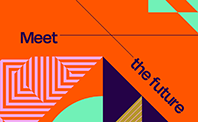

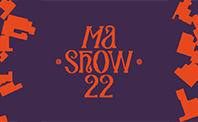
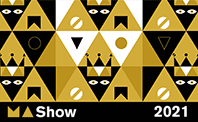
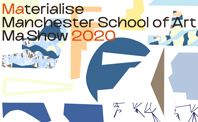

Graduates
We cultivate highly motivated, independent and creative thinkers who can transfer their skills into the creative marketplace, as entrepreneurial innovators, freelance practitioners and innovative team players. Past graduates predominantly achieve graduate-level positions or practise as sole traders, design studio artists, exhibiting artists, museum curators, archivists, researchers, academics, community practitioners, specialist technicians and filmmakers at national and international levels.
Making an Application
Entry Requirements
You will normally have a minimum 2:2 UK undergraduate honours degree (or equivalent) in a related subject and must submit a portfolio. We may request an interview as part of the application process, which can be in person or online.
Overseas applicants will require IELTS with an overall score of 6.5 and no less than 5.5 in any category, or an equivalent accepted English qualification.
How to Apply
Please apply online using the link below. In your personal statement please include a web address to an online portfolio containing a selection of images or videos of your past work. You should also explain how you would like to develop your practice during the course.
Fees 2025 Entry
UK and Channel Island students
Full-time fee: £12,000 per year. Tuition fees will remain the same for each year of your course providing you complete it in the normal timeframe (no repeat years or breaks in study).
Part-time fee: £2000 per 30 credits studied. The fee per credit will remain the same for each year of your course providing you complete it in the normal timeframe (eg no repeat years or breaks in study). The total amount you pay each year may differ based on the number of credits studied.
EU and non-EU international students
Full-time fee: £22,000 per year. Tuition fees will remain the same for each year of your course providing you complete it in the normal timeframe (no repeat years or breaks in study).
Part-time fee: £3667 per 30 credits studied. The fee per credit will remain the same for each year of your course providing you complete it in the normal timeframe (eg no repeat years or breaks in study). The total amount you pay each year may differ based on the number of credits studied.
Additional information
A masters qualification typically comprises 180 credits, a PGDip 120 credits, a PGCert 60 credits, and an MFA 300 credits. Tuition fees will remain the same for each year of study provided the course is completed in the normal timeframe (no repeat years or breaks in study).
Eligible alumni receive a 20% discount on their postgraduate tuition fees. Find out more about our Alumni Loyalty Discount.
Course Leader
- David Grimshaw
Deputy Head of Design
Subject Lead MA/MSc Product Design & MA/MSc Craft
—
